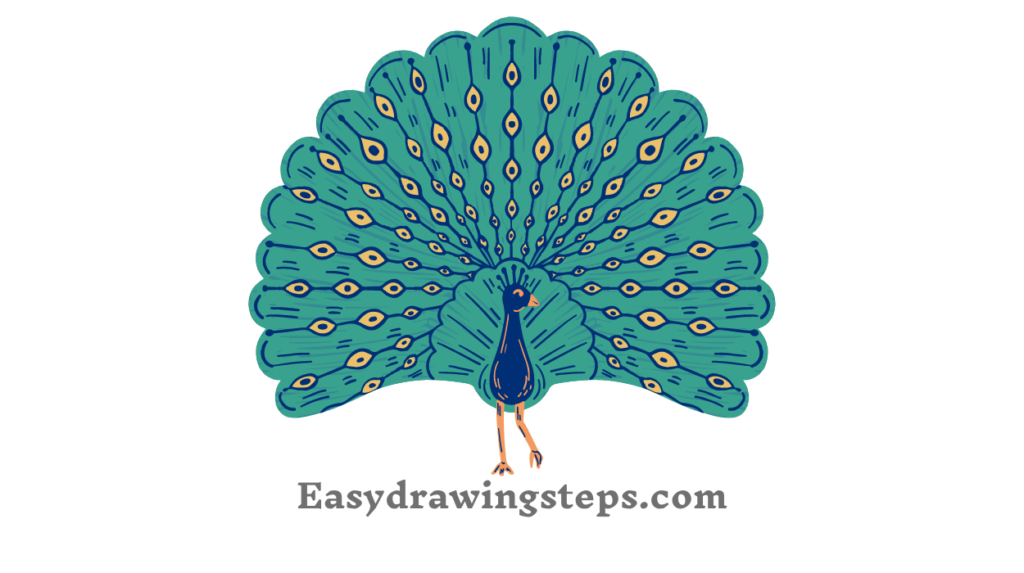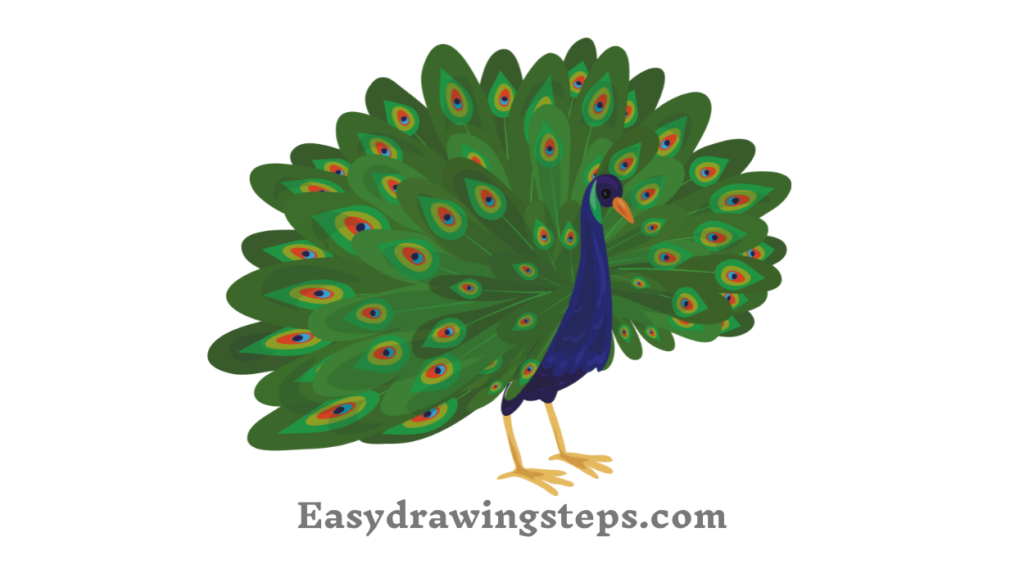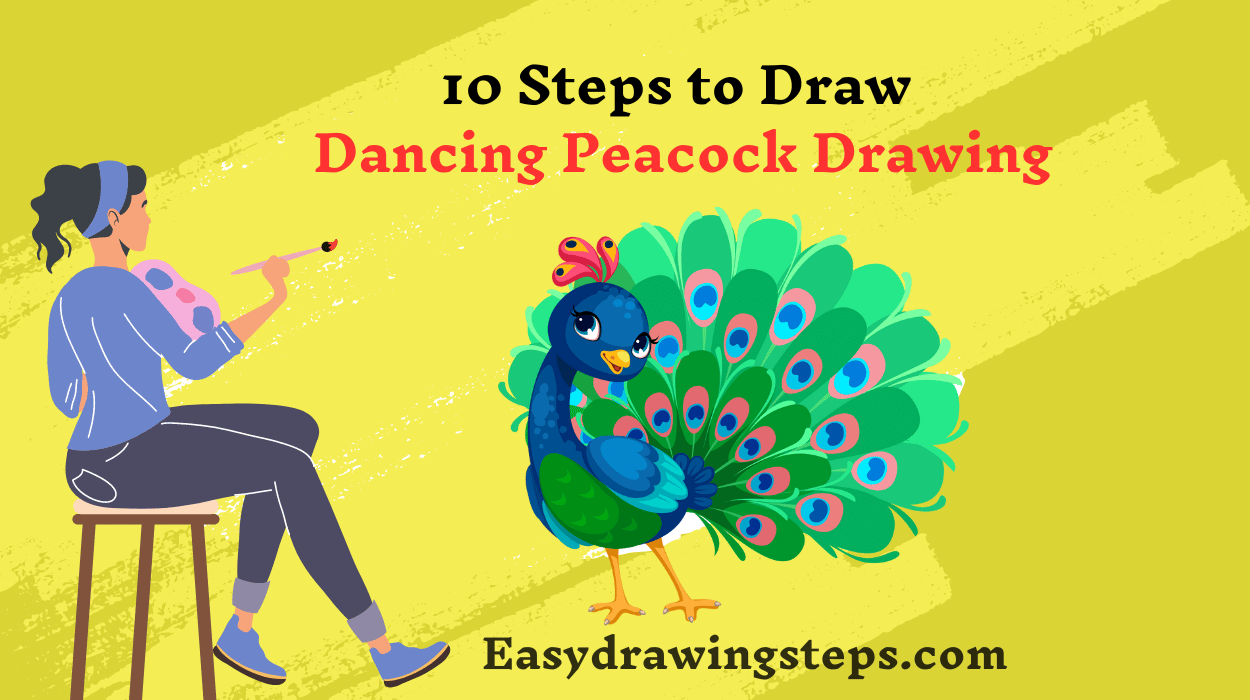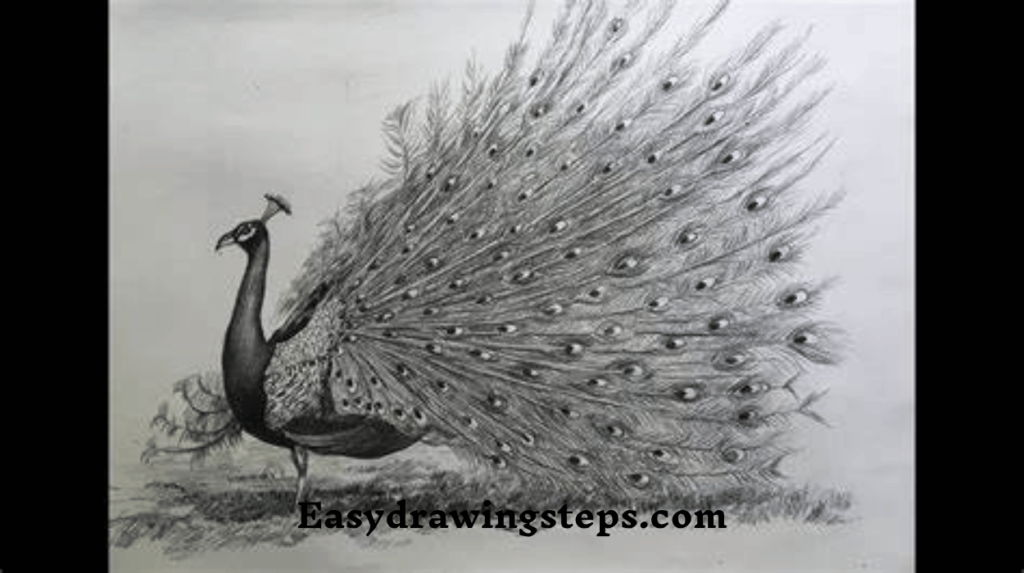Dancing Peacock Drawing : Drawing a dancing peacock can be an enchanting project, bringing the grace and beauty of this magnificent bird to life on paper. Whether you’re aiming for a detailed artwork or a simple sketch, this guide will help you through ten easy steps to create a stunning representation of a dancing peacock.
Step 1: Sketch Basic Shapes
Begin by drawing the basic shapes that will serve as the framework for your peacock. Start with a small circle for the head and a larger oval for the body. Connect these shapes with a curved line for the neck. For the tail feathers, sketch several elongated ovals extending from the back of the body. These shapes will help you establish the proportions and positions.

Step 2: Outline the Head and Neck
Refine the outline of the head and neck by adding details such as the beak and eyes. Draw a small triangular shape for the beak and two small circles for the eyes. Smooth the neck with gentle curves to ensure it flows naturally from the body. This step is crucial for capturing the elegance of the peacock’s posture.
Also Read : 10 Easy Steps to Draw Peacock Drawing Easy And Beautiful
Step 3: Define the Body and Tail Feathers
Draw the body with flowing lines that connect smoothly to the head and neck. For the tail feathers, sketch several curved lines that fan out from the base, forming the plumage. Ensure the tail feathers have a graceful curve to convey the dancing motion. This will give your drawing a dynamic and fluid appearance.
Step 4: Add Details to the Feathers
Detail the feathers by adding individual feather patterns and textures. Within each tail feather, draw lines to represent the feather’s structure and add eye shapes or other patterns to enhance realism. This step will add depth and interest to the peacock’s elaborate tail.

Step 5: Refine the Outline
Go over your initial sketch with a darker pencil or pen to clearly define the lines. Erase any unnecessary or overlapping lines to clean up the drawing. This refined outline will serve as the basis for adding color and further details.
Step 6: Apply Base Colors
If you’re adding color, start with a base layer for the peacock’s feathers. Use light strokes to apply primary colors, such as vibrant blues, greens, and golds. Focus on getting a smooth base layer that will serve as the foundation for additional shading and blending.
Also Read : 10 Easy Steps to Draw Peacock Drawing For Kids
Step 7: Blend and Layer Colors
Blend the colors to create a smooth transition and add depth to the feathers. Use a blending tool or colored pencils to merge different shades seamlessly. Layering various colors will enhance the peacock’s natural shine and make the feathers look more realistic.
Step 8: Highlight the Dancing Motion
Emphasize the dancing motion by adding highlights and shadows. Use a white or light-colored pencil to add highlights where light hits the feathers. Add shadows to areas where the feathers overlap or where the body casts shadows. This will give your drawing a sense of movement and dimension.
Also Read : 10 Steps to Draw Pencil Easy Peacock Drawing
Step 9: Add Simple Background Elements
Incorporate simple background elements to enhance your peacock drawing. Sketch a few elements like flowers, grass, or a natural setting that complements the peacock without overpowering it. Use light colors for the background to maintain focus on the dancing peacock.
Step 10: Final Touches and Refinements
Review your drawing for any final adjustments. Enhance the details of the feathers, refine the colors, and make sure the highlights and shadows are well-blended. Add any additional touches to complete the drawing and bring out the beauty of the dancing peacock.
Drawing a dancing peacock can be a rewarding artistic endeavor, whether you’re aiming for a detailed piece or a simple sketch. By following these ten easy steps, you can create a beautiful and dynamic representation of this magnificent bird. Enjoy the process and let the elegance of the peacock inspire your creativity.
Dancing Peacock Drawing FAQ
What are the first steps to start drawing a dancing peacock?
Begin by sketching basic shapes to form the foundation of your peacock. Draw a small circle for the head and a larger oval for the body. Connect these shapes with a curved line for the neck and add elongated ovals for the tail feathers. These basic shapes will help you establish the proportions and position of the peacock.
How do I add detail to the peacock’s feathers?
To add detail to the feathers, start by drawing individual feather patterns and textures. Within each tail feather, sketch lines to represent the feather’s structure and add eye shapes or other patterns. This step will make the feathers look more realistic and add visual interest to your drawing.
What is the best method for blending colors in a dancing peacock drawing?
Start by applying a base layer of color with light strokes. Then, use a blending tool or colored pencils to merge different shades smoothly. Layer colors gradually to create depth and a natural shine. This technique will help achieve a seamless and vibrant look for the peacock’s feathers.
How can I emphasize the dancing motion in my peacock drawing?
To highlight the dancing motion, add highlights and shadows to your drawing. Use a white or light-colored pencil to create highlights where light hits the feathers. Add shadows to areas where feathers overlap or where the body casts shadows. These elements will convey a sense of movement and dimension in your drawing.
What are some simple background elements I can add to complement the peacock?
Consider adding simple background elements such as flowers, grass, or a natural setting. Use light colors for the background to ensure it complements the peacock without overpowering it. These elements can enhance the overall composition of your drawing and provide context for the dancing peacock.


